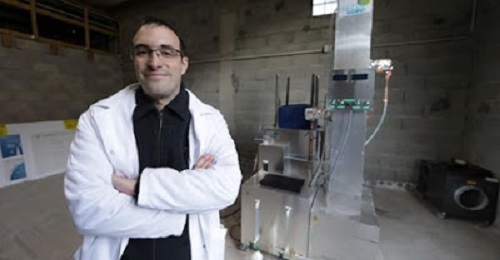
|
Mother Pelican
A Journal of Solidarity and Sustainability
Vol. 15, No. 10, October 2019
Luis T. Gutiérrez, Editor
|
|
|
|

|
|
|
Another Lone Genius Saves the World with His Invention:
How Naive Can People Be?
Ugo Bardi
Originally published by
Cassandra's Legacy, 9 September 2019
under a Creative Commons License

Another lone scientist ready to save the world.
Photo credit: Reuters/Eric Gallard.
|
When I stumbled into this article, I thought it was a joke. You know, the kind that goes, "Scientists find a solution to stop forest fires in the Amazon: all that's needed is to cut the trees and turn it into a giant parking lot!"
But no, it was supposed to be serious. The author of the post informs us in all seriousness that "A self-taught French scientist bankrolled by a French actor has come up with a brilliant solution to the problem of plastic waste. His machine — dubbed "Chrysalis" — converts hard-to-recycle plastic trash into 65% diesel, 18% gasoline, 10% gas and 7% carbon."
In case you are perplexed, let me explain to you what this guy is proposing to do: 1) you extract oil and gas from the ground. 2) send it to a refinery and turn into plastics 3) manufacture plastic items and sell them, 4) throw away the plastic objects. 5) collect and separate the plastic waste 6) send the stuff to the machine developed by the self-taught French scientist, above. 7) Turn the stuff into liquid/solid/gaseous fuels. 8) separate the fuels. 9) Sell the fuels. 10) Burn them in inefficient thermal engines. And that's called a "brilliant solution to the problem of plastic waste.
Now, what is the efficiency of this 10-step process? We have no data about the efficiency of the Chrysalis process, nor about how the inventor deals with the pollution it must necessarily produce. But, just looking at the number of steps involved, would you think that the whole chain could have an EROEI larger than one, the minimum needed for an energy-producing process to be viable? More likely, it would be way lower.
It doesn't seem that the self-taught genius (or the journalist who wrote the piece) could think it would have been way simpler to burn the plastics in a waste-to-energy plant or, much better: just don't produce so much of the stuff! At which point do people start understanding that there are ways to simplify your life rather than making it more and more complicated?
But, no. The archetype of the lone, smart, intelligent scientist is too powerful in people's minds. Here is another example, rather similar. This time it is two young ladies described as "Students Invent Bacteria That Eat Plastic From The Oceans And Turn It Into Water." Apart from forgetting that plastic is made mainly out of carbon and that turning into "water" only would need some kind of nuclear transmutation, it is the same problem. We have no data on the efficiency and the cost of a process that would imply collecting plastics waste from the oceans, collecting it, treating it, and turning it mainly into additional CO2 that goes into the atmosphere to create global warming. Wouldn't it be simpler just avoiding to produce the stuff that creates so much damage?
These are just two recent examples of hyped press releases all based on the same concept: a lone genius invents something that will save the world. It is an idea that probably comes from the "heroic" period of technology, about one century ago, when inventions were associated with the names of single inventors. So, the light bulb was invented by Thomas Edison, the telegraph by Samuel Morse, the telephone by Alexander Bell, the plane by the Wright brothers, and so on. But that was a different age, when it was possible to build the most advanced plane in the world on the budget of a bicycle repair shop. Today, you could do the same, but a propeller biplane built by amateurs would hardly make a splash in the international aviation market.
Today, the lone genius is as antiquated as biplanes: it is simply because the cheap things have been already invented and now we are left with expensive ones. As a result, most of these modern lone geniuses are inventing things already invented long ago. About the French Chrysalis, I have been hearing about turning plastics into fuel from the time when I was a student in chemistry, in the 1970s and turning carbon-based solids into fuels is a technology known from the time of Franz Fischer and Hans Tropsch, in the 1920s. Maybe the French genius of the article has developed some special trick but allow me to doubt that -- and even if that were the case, the whole idea remains flawed at its roots.
Similar considerations hold for plastic-eating bacteria. They are a more modern technology, but well known, too. If you search on "Google Scholar," you'll find more than 44,000 papers and patents that mention the concept of "plastics degrading bacteria." The first attempts to develop such bacteria go back to the 1990s. Again, maybe the two young ladies cited in the article discovered some new trick that nobody had imagined before, but I would doubt that and -- all the same -- it is the concept itself that's flawed.
So, we are so desperate about the quandary in which we found ourselves that we can't find anything better than searching for comfort in these stories of scientists described as super-heroes from comic books. But these modern heroes can only reinvent things already invented. It is becoming one more form of pathological science. But how naive can people be?
|
ABOUT THE AUTHOR
Ugo Bardi teaches physical chemistry at the University of Florence, Italy, and is a member of the Club of Rome. He is interested in resource depletion, system dynamics modeling, climate science and renewable energy.
|
|
|
|
|
"Patriotism is the last refuge of scoundrels."
— Samuel Johnson (1709-1794)
|
|
Page 5
|
|
FREE SUBSCRIPTION
|
![[groups_small]](groups_small.gif)
|
Subscribe to the
Mother Pelican Journal
via the Solidarity-Sustainability Group
Enter your email address:
|
|
|
|